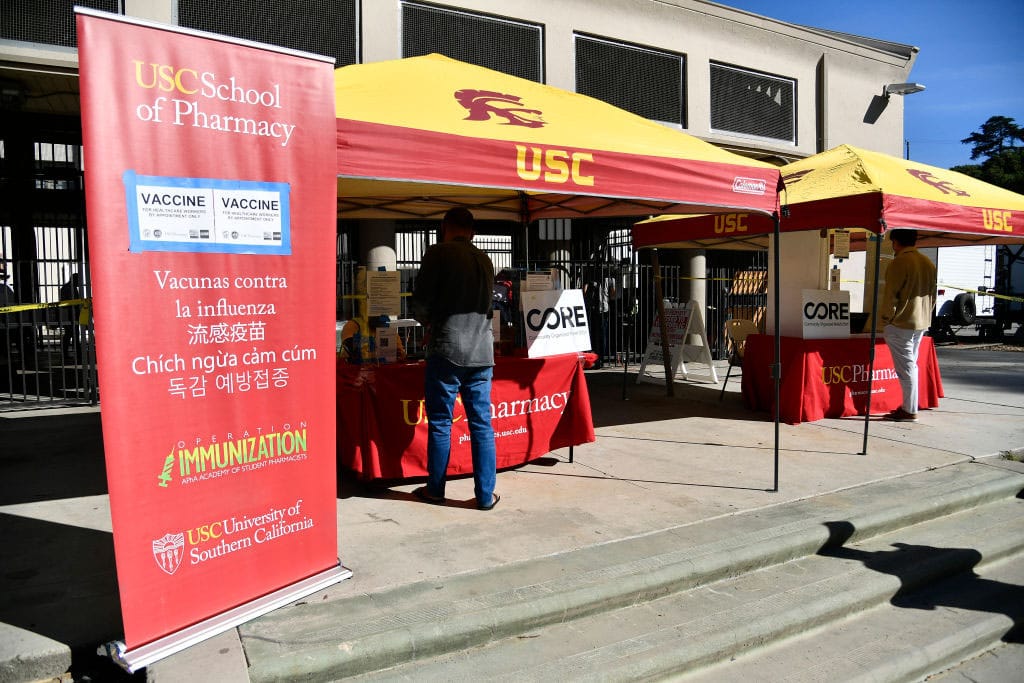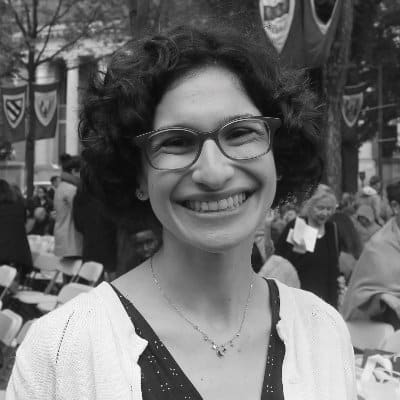 A coronavirus testing and vaccination site at Lincoln Park in Los Angeles, California. (Photo by Frazer Harrison/Getty Images)
A coronavirus testing and vaccination site at Lincoln Park in Los Angeles, California. (Photo by Frazer Harrison/Getty Images) On January 14, the Los Angeles Times reported that about one in three county residents have been infected with COVID-19. Watching the surge in cases, many residents are rightfully asking why the county’s vaccine rollout is taking so long. The big reason for the delay? There are simply not enough vaccine doses at this time.
That was the big takeaway from the January 13 talk hosted by Jews United for Democracy and Justice (JUDJ) and Community Advocates, Inc. The event, titled “COVID-19, Vaccinations, and YOU: How Will it Work?” featured Dr. Barbara Ferrer, the director of the Los Angeles County Department of Health. The event was moderated by Larry Mantle, host of “AirTalk With Larry Mantle” on KPCC.
Ferrer began the talk by noting the stakes of the vaccine rollout, stating that “here in L.A. county, 80% of the people who are dying are people who are older.” She added, “we have more people dying every day in L.A. county of COVID-19 than we have dying of every single other cause of death combined.”
Prioritization
Mantle asked Ferrer what the recent Centers for Disease Control and Prevention (CDC) directive to vaccinate individuals over the age of 65 meant for Los Angeles’ vaccine distribution.
Ferrer explained that officials had to temper vaccinating older populations with vaccinating all of the county’s healthcare workers, who number as many as 800,000. “And no, L.A. county has not received 800,000 doses of vaccine yet, and as part of our allocation, we are actually in the process of giving everyone their second dose, which really means for 800,000 healthcare workers, you need 1.6 million doses of vaccine — and we’re nowhere near that,” she added. As of January 6, the county had received 490,995 doses.

Mantle asked Ferrer if the new CDC guidelines meant that individuals over 65 needed to be vaccinated immediately after front-line workers — not all healthcare workers. Ferrer responded that front-line workers is an expansive category. She noted, “within what’s called phase 1a” includes custodians, receptionists, lab workers, home healthcare workers and more.
Ferrer added that the 82 acute care hospitals in L.A. county have given all their front-line workers, who are regularly exposed to COVID-19, their first dose of the vaccine. But “most of them are still doing their second doses.” Private practitioners, clinics and psychiatric urgent care workers not in the hospital network still need to be vaccinated.
Mantle asked if the CDC directives meant that officials need to give the doses reserved for the second round of healthcare vaccinations to those 65 and older. Ferrer responded that “nobody’s holding anything in reserve. What we’ve been promised is that when we get an allocation for a first dose, when it’s time for that second dose to happen, we will get the subsequent allocations for those second doses.” There is no recommendation to forgo the second dose, she emphasized.
Mantle requested that Ferrer elaborate on the tiers of vaccine priority. “It’s a very complicated system” through “what are called phases,” she explained. The first phase is 1a, which includes front-line workers and long-term care facilities. As for Phase 1b, “we anticipate being here at the end of January/the beginning of February.”
Within each phase, Ferrer explained, are tiers as well. She said the state has “reprioritized” the order of eligibility for vaccination in phase 1b so that “at the top of the list are people 65 and older.” After those 65 and older come “workers at education and daycare sites, … workers in food and agriculture … and public safety first responders” to round out phase 1b. Those with high-risk conditions are not included in 1b.
Ferrer elaborated that “the CDC makes recommendations, the states take those recommendations and turn them into a framework for prioritizing vaccinations and then the local health departments are asked to follow that prioritization” and pursue implementation. “Getting more vaccine will be key to actually moving through this fairly quickly,” she added.
Getting the Vaccine
Ferrer said there is an online system to register for a vaccine that went live on January 13, so “hundreds of pharmacies already [are] registered and approved,” and many of the “larger” sites are already approved. As of now, there are “75 different sites” in the county where you can get vaccinated, she explained. “Starting on Tuesday, we start with these big vaccination sites,” many of which can do 4,000 vaccinations a day; Dodger Stadium could do 6,000.
Based on the prioritization, she noted, only healthcare workers will be able to schedule an appointment at this time, since not all get their vaccines at work. Ferrer said you could register online to receive an email when it is “your turn” to schedule a vaccine appointment. When that time comes, the site’s scheduler will tell you “where throughout the county we have appointments… where you can register.”
All sites, she emphasized, will require patients to “go to the portal, sign up and get an appointment.” You will likely be asked to establish residency to get vaccinated at these public sites.
Ferrer added that the county needs to make getting a vaccine more accessible for elderly individuals, such as setting up “call centers” to register for a vaccine (beyond the online site), as well as removing other obstacles and long waits. In addition to setting up large vaccination sites, the county is working to register and approve “trusted healthcare providers” and “home care agencies” to distribute the vaccine.

The VA has a separate system for vaccination, she added, “and they get a direct allocation from the federal government.” (See the site here: https://www.va.gov/health-care/covid-19-vaccine/)
Addressing Delays and Confusion
Ferrer explained that part of the confusion in the system stems from the fact that money went into developing the vaccine, but “there was no money given to public health to build out any systems for administering the vaccine.” “We got a few million dollars across the state to try to build this massive vaccination system,” she said.
“There was no money given to public health to build out any systems for administering the vaccine.”
“There was no federal plan” that went out to help counties and states roll out vaccination, she added. “As a matter of fact, a lot of systems were set up that went completely around the health departments.” Ferrer cited the federal Pharmacy Partnership with CVS and Walgreens to vaccinate individuals in long-term care facilities “that never really launched when it was supposed to launch.” She explained that those pharmacies get their “allocations directly from the feds; they don’t go through the county allocation systems.” As a result of the federal program’s delays, the county created its own system to vaccinate long-term care residents and staff.
But the real issue, she stated, is the lack of sufficient vaccine. “I personally don’t have enough vaccine here in L.A. county to actually give [the] vaccine to every site that is set up to vaccinate next week. I have to negotiate now with the state to see whether we can get all the doses that we need to make sure that everyone who has an appointment next week is actually going to get vaccinated.”
“That is a problem at the federal level; we have no idea when the vaccines are coming and how much we are getting,” Ferrer explained. The recent CDC announcement, she added, was created without a plan for implementation in place. Ferrer did not address why other counties have been able to enter phase 1b and begin vaccinating individuals 65 and older, nor did she address the problems other states are facing in vaccinating the elderly. Ferrer also did not discuss reports regarding unused dosages.
Towards the end of the call, Ferrer emphasized the need for vaccination — even if you have to keep wearing masks and socially distance after. Even if you’ve had COVID-19, she stated, you should get vaccinated because “people have been reinfected,” and there is no sense of how long immunity lasts after infection.
In the interim, Ferrer said that masks, social distancing and infection control at “sites where people may be together” can reduce transmission “by a lot.” The health department based its latest virus restrictions on those facts. But they are looking into additional restrictions given that cases have not declined. “If you don’t need to go shopping, don’t go shopping,” she added.
“This has been a very long year,” she concluded, “we have a ways to go.”
Sign up to get notified when you can schedule an appointment for vaccination here: http://publichealth.lacounty.gov/media/Coronavirus/vaccine/index.htm
The cohosts, JUDJ and Community Advocates, Inc. have hosted a variety of talks since April 25, 2020, as a part of their “America at a Crossroads” series. JUDJ is a coalition asserting “a Jewish voice to safeguard the principles and foundations of our constitutional democracy,” and Community Advocates, Inc. is a nonprofit “that advocates innovative approaches to human relations and race relations.” Prior events have included conversations with Bret Stephens, Congressman Adam Schiff, Max Boot and Mayor Eric Garcetti. These events are free and open to the public.
Watch the entire conversation here: https://www.youtube.com/watch?v=5GHsdrP8-q8






















 More news and opinions than at a Shabbat dinner, right in your inbox.
More news and opinions than at a Shabbat dinner, right in your inbox.